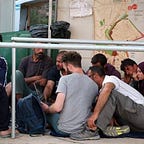“Obvious” pro/anti No Fly Zone arguments
Foreign policy and national security experts say it’s “obviously” a terrible idea, it’s obvious that every day we delay more Ukrainians get massacred.
It’s only “obvious” that a NFZ is a terrible idea and only “not credible” people support it if you have an assumption than Ukrainians’ lives (and Syrians & Bosnians, who’ve pleaded for a NFZ before) are less important than your own life. Without that assumption, it’s a complex, hard risk-balancing decision.
For the ordinary people who care about other people far away what’s obvious is that every night that Ukrainians don’t have a No Fly Zone many people are getting killed.
The Ukrainian Parliament publicly called for international assistance to enforce a No Fly Zone on Saturday last week:
https://twitter.com/ua_parliament/status/1497192726546116610?
To be more specific, they asked for a NFZ over Kyiv and Chornobyl, but I guess that was because they thought it would more likely be agreed to than if they made a bigger request for international air force protection of their whole country.
You may be a highly authoritative expert in the field of foreign policy or national security, or listening to or reading them, but the assumption that each state should value its own nationals more than those of other states is a moral assumption, which is normal in those fields, but ordinary citizens are not obligated to follow or believe in those specialist fields’ sub-cultural moral norms, and that has nothing necessarily to do with denying or ignoring facts.
It’s really not the same kind of disagreement as people claiming to have “done their research” on google and then denying basic facts of immunology and epidemiology and refusing to listen seriously to doctors and scientists on covid19 issues.
IF there are really less risky ways of achieving the same level of protection for Ukrainians, e.g. by giving the Ukrainian air force more jets, better jets, and more surface-to-air guided missiles, ok, try that first, but if or when that becomes clearly not enough to protect “them” as much as we would want to be protected ourselves, it should not be that we value a potential risk to ourselves, without even stating a % probability estimate for that risk, more than a certainty of serious harm to “them” just because of a conventional fiction called ‘nationality’.
I’m not saying it wouldn’t come with extremely severe risks, altho I think those are low probability. And I think not doing it also carries a % probability risk, maybe even higher, of the same extremely severe outcomes, only later.
“But WW3 with Russia!” has been a common trope of Russian propaganda for a very long time, aimed at securing unlimited appeasement and procrastination about forcefully limiting their mass atrocities and global hybrid warfare against old and newly emerging democracies since 1992. Of course, it contains an element of truth — they do have nuclear weapons, we do not have the capacity to pre-emptively destroy or intercept all of those. That is an extremely severe risk.
Those arguing we should never take the risks of enforcing a No Fly Zone against the Russian regime air force, at least owe us clarity about how they are assessing severity x probability, compared to realistically available alternatives, not in isolation. We should also not discount the risks of inaction, or inadequate action til too late, which we’re seeing more examples of now.
Inadequate or delayed action because we were thinking too long about the risks of action can lead to higher probability of extremely severe risks.
Being wrong before doesn’t necessarily mean people are wrong again, but it is relevant to recall that most authoritative experts were dismissing the possibility that the Russian regime would invade Ukraine until just before it happened. The normal assumptions within their professional field — e.g. that other state actors are ‘rational’, precluded acknowledging the material facts.
Experts arguing against a NFZ for Ukraine owe us at least a clear argument about their estimates of probabilities for different options, set in realistic context, not as if the NFZ option and its risks exist in isolation, and, if they are assuming that a NATO state’s citizen’s life is more valuable than any other human’s life, they should at least say that is the basis of their argument.
If using Ukraine as a buffer zone to protect themselves from direct confrontation with Putin’s forces is part of their argument, at least say so, and explain why they believe such a strategy is even workable per its own aims. If we sacrifice Ukrainians to avoid risks to ourselves, like we did to Syrians for 11 years so far and to Bosnians for nearly 3 years til Operation Deny Flight started, why should we believe that it will really work to prevent risks to ourselves longer-term?
The reason I disagree with almost all the experts on this is that I value other human beings equally, I consider ‘nationality’ a social artefact, not morally relevant, and I don’t agree with the national security norm of valuing “our” lives more than “theirs”, and absolutely prioritizing avoiding even tiny % risks to ourselves even if that means sacrificing a group of other people, again.
#NeverAgain means now. #NFZ #ukrainenfz #ukrainenfznow
